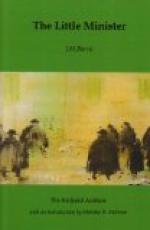CHAPTER XXVI.
Scene at the Spittal.
Within an hour after I had left him, Waster Lunny walked into the school-house and handed me his snuff-mull, which I declined politely. It was with this ceremony that we usually opened our conversations.
“I’ve seen the post,” he said, and he tells me there has been a queer ploy at the Spittal. It’s a wonder the marriage hasna been turned into a burial, and all because o’ that Highland stirk, Lauchlan Campbell.
Waster Lunny was a man who had to retrace his steps in telling a story if he tried short cuts, and so my custom was to wait patiently while he delved through the ploughed fields that always lay between him and his destination.
“As you ken, Rintoul’s so little o’ a Scotchman that he’s no muckle better than an Englisher. That maun be the reason he hadna mair sense than to tramp on a Highlandman’s ancestors, as he tried to tramp on Lauchlan’s this day.”
“If Lord Rintoul insulted the piper,” I suggested, giving the farmer a helping hand cautiously, “it would be through inadvertence. Rintoul only bought the Spittal a year ago, and until then, I daresay, he had seldom been on our side of the Border.”
This was a foolish, interruption, for it set Walter Lunny off in a new direction.
“That’s what Elspeth says. Says she, ’When the earl has grand estates in England, what for does he come to a barren place like the Spittal to be married! It’s gey like,’ she says, ’as if he wanted the marriage to be got by quietly; a thing,’ says she, ‘that no woman can stand. Furthermore,’ Elspeth says, ’how has the marriage been postponed twice?’ We ken what the servants at the Spittal says to that, namely, that the young lady is no keen to take him, but Elspeth winna listen to sic arguments. She says either the earl had grown timid (as mony a man does) when the wedding-day drew near, or else his sister that keeps his house is mad at the thocht o’ losing her place; but as for the young leddy’s being sweer, says Elspeth, ’an earl’s an earl however auld he is, and a lassie’s a lassie however young she is, and weel she kens you’re never sure o’ a man’s no changing his mind about you till you’re tied to him by law, after which it doesna so muckle matter whether he changes his mind about you or no.’ Ay, there’s a quirk in it some gait, dominie; but it’s a deep water Elspeth canna bottom.”
“It is,” I agreed; “but you were to tell me what Birse told you of the disturbance at the Spittal.”
“Ay, weel.” he answered, “the post puts the wite o’t on her little leddyship, as they call her, though she winna be a leddyship till the morn. All I can say is that if the earl was saft enough to do sic a thing out of fondness for her, it’s time he was married on her, so that he may come to his senses again. That’s what I say; but Elspeth conters me, of course, and says she, ’If the young leddy was so careless o’ insulting other folks’ ancestors, it proves she has nane o’ her ain; for them that has china plates themsel’s is the maist careful no to break the china plates of others.’”




